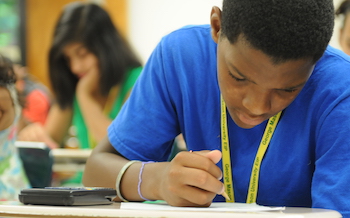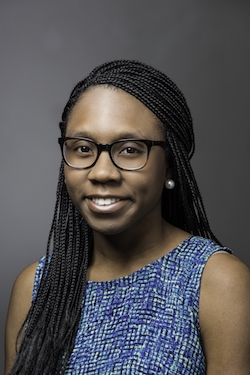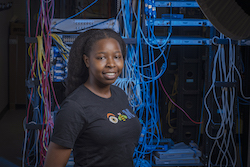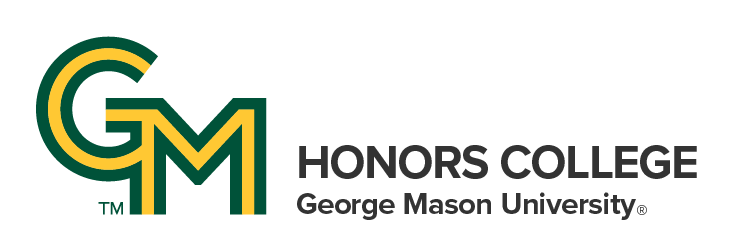
College Application Coaches help future first generation college students
“Everyone close your eyes,” asked Kareema Smith, Director of Student Success, after hearing Eva Bramesco, the Senior Assistant Director of Honors College Admissions speak about the college application process to a room full of first-generation, college-bound high school juniors in the Early Identification Program (EIP).
“Raise your hand if you knew about these opportunities and resources before today’s session.” Some students raised their arms.
“Now, raise your hand if you’re excited about these opportunities,” asked Smith.
Nearly all the students held their hands up high.
This Saturday morning session kicked off the Spring 2019 College Applications Coaches experience, currently offered as HNRS 330 Research, Technology, and Online Community: College Application Coaches. Under the redesigned Honors College curriculum, the same College Application Coaches experience – among other existing hands-on workshops related to civic engagement – will be offered as HNRS 261: Community Connection Practicum: College Application Coaches.

Kareema Smith
College Application Coaches – led by Kareema Smith, Eva Bramesco, and Richard Todd Stafford – pairs HNRS 261 students with college-bound EIP students throughout various Northern Virginia School Districts. Undergrads serving in the program meet with their mentees in person a minimum of two times, while corresponding online throughout the spring season and beyond.
Coaches support their high school peers in various ways: assisting with application essays, helping create and improve resume writing skills, connecting them with campus resources, and encouraging their growth and success through regular in-person and virtual meetings.
“This is civic engagement,” explains Smith, emphasizing the value of accessibility in the collegiate space and beyond. “Our [Honors College] students are going into communities, going into high schools and connecting with students.”
The EIP is a multiyear, collaborative program between George Mason University and seven local school districts in Northern Virginia that supports and prepares college-bound middle and high school students who will be the first in their families to access higher education.
Connecting on a personal level with their coaches – many of whom were EIP students themselves – enables current EIP students to enrich their confidence and envision their future success as college students.
“I was stressed about FAFSA forms, but my mentor helped me,” shares Adriana Jaramillo, a former EIP student who now serves as a College Application Coaches mentor.
“She told me that she didn’t get much financial aid from FAFSA, but that in college she received an EIP scholarship. I felt more relaxed,” reflects Jaramillo, now a sophomore Civil Engineering major. “It reminded me that I have resources.”
College Application Coaches prepares first-generation students to optimize their college applications. While EIP students are encouraged to apply to Mason, the program prepares them to apply to their schools of choice. Additionally, the program expands their understanding of what an Honors College is, through the lens of Mason’s Honors College experience.
.jpg)
Eva Bramesco
“We noticed that EIP students weren’t always applying to the Honors College,” explains Eva Bramesco. Bramesco notes that whether high schoolers are first generation or not, the Honors College may not always be familiar to prospective students.
Undergrads electing to take HNRS 261: College Application Coaches help EIP students understand how the Honors College program enriches the Mason college experience.
“We aim to alleviate that mystery,” says Bramesco, emphasizing that College Application Coaches is an invaluable civic engagement experience. “We help them put together their best possible applications.”
Right before the Spring 2019 semester started, EIP students spent a full Saturday on campus connecting with their Mason mentors. Coaches helped their EIP companions to craft their college application essays, encouraging them to write an extra essay for Honors College admission.
This is civic engagement. Our students are going into communities, going into high schools and connecting with students.
Kareema Smith
One EIP student set a personal goal to reach 650 words on her application essay. “One of our coaches was working with this EIP student, who had reached around 300 words,” recounts Smith.
By the end of the Saturday session, “she was excited to share her personal essay with us,” says Smith. “We’d met them at 9:00a.m., and now these connections had occurred,” noting the inspiring and reassuring energy that the mentors brought to the learning environment.
Another coach, Honors College sophomore Jasmine James, reassured an EIP student who decided to restart her essay from scratch. “[Afterwards], she sent me a long email saying she was grateful,” shares James. “If she was happy in the end, that’s the best I can ask for.”
James, a Biology major, helps her mentees understand that their essays need to be about who they are as a whole person. That Saturday afternoon, she encouraged her students to ask themselves self-reflective questions like “what’s so special about this field to you?”
“I enjoy talking with and building relationships with them,” says James, who has prior experience coaching EIP students through her involvement with the Academic Mentoring Program (AMP).
AMP – a required component of the EIP – pairs prospective college students with Mason undergrads. As an AMP mentor, James tutors her high school peers on homework while encouraging their personal and professional development.
“[There were] three students at our Saturday kickoff session that I already knew very well,” explains James, who recommends fellow Honors College students enroll in College Application Coaches for HNRS 261 credit. “There’s a satisfaction to helping students.”
Many first-generation high school students lack access to higher education in the same capacity as their peers. “Being a first-generation student, you never really get that help,” says Jaramillo, who spent much of her Saturday session helping an EIP student strengthen his resume writing skills.
“While going over essays, there was one student who didn’t know what a resume was,” Jaramillo explains.
Jaramillo helped her student realize and embrace his substantial extracurricular achievements. “He got really excited and it made me feel excited,” shares the civil engineer. “He felt more confident in himself. You could really see it.”

Doreen Joseph, EIP alumna and Honors College Application Coache
Another coach, Honors College senior Doreen Joseph, shares how being a former EIP student inspired her to give back.
“When I started at Mason, there was already a community that was invested in my success,” says Joseph, a Cybersecurity Engineering major. “This is my way of giving back.”
Joseph reflects positively on helping EIP students narrow their essay topics. “It’s cool to see them zoom in on their essay focus and present this amazing snapshot on the person that they are.
As a coach, Joseph strengthens and refines her skills as a civic engagement leader. By guiding and relating with younger peers in her community, Joseph is building competencies that are transferable to her personal and professional development.
“It builds up my own confidence,” reflects Joseph, who has served as Resource Chairperson for the Honors College Multicultural Alliance (HCMA), a student organization whose mission is to promote diversity and inclusion within the Honors College.
When I started at Mason, there was already a community that was invested in my success. This is my way of giving back.
Doreen Joseph
"The coaches get excited and confident in their own expertise,” says Bramesco. “It helps the EIP students realize ‘these are people like me, 2-3 years from now.’”
By creating connections with their EIP companions, Jaramillo, Joseph, James and other Honors College students are learning about their own leadership capabilities. This process of self-reflection and evolution through impactful community involvement defines the HNRS 261 experience.
College Application Coaches emphasizes civic learning by encouraging Honors College students to question current issues of higher education accessibility.
“It’s not just about helping students apply to college,” explains Smith. “It’s asking the questions: why do people have less access? We look closer at these [societal] structures, examining them from a critical lens.”
Students with a passion for serving others and promoting inclusivity will benefit from immersing themselves in HNRS 261 practicums like College Application Coaches. This is just one Honors College course offering among many other community involvement options.
Each of these hands-on experiences prepare Honors College students to shoulder their responsibilities as citizens, driving positive impacts one person at a time.
“Looking back, [EIP] was the largest way of helping me understand the world of college. It was my introduction to people who looked like me,” says EIP alum Cristian Pineda, who now serves as Mason’s Admissions Coordinator of K-12 Partnerships. “The Honors College partnering with EIP is a huge leap, challenging our students to apply higher.”
Pineda reflects on the lasting impact these programs have on students for life.
“It’s about helping these students remember: You were nominated to come here,” says Pineda. “There’s always a positive outcome in the end.”
Original reporting by Jimmy O'Hara
